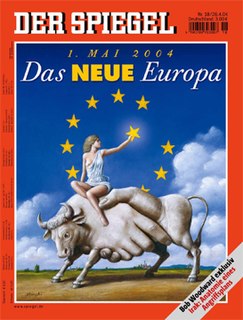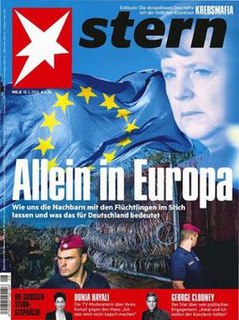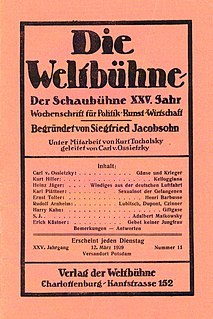
Der Spiegel is a German weekly news magazine published in Hamburg. With a weekly circulation of 695,100 copies, it is the largest such publication in Europe. It was founded in 1947 by John Seymour Chaloner, a British army officer, and Rudolf Augstein, a former Wehrmacht radio operator who was recognised in 2000 by the International Press Institute as one of the fifty World Press Freedom Heroes. Typically, the magazine has a content to advertising ratio of 2:1.
As in most countries, Germany has a standard way of citing its legal codes and case law; an essentially identical system of citation is also used in Austria.

Stern is an illustrated, broadly left-liberal, weekly current affairs magazine published in Hamburg, Germany, by Gruner + Jahr, a subsidiary of Bertelsmann. Under the editorship (1948–1980) of its founder Henri Nannen, it attained a circulation of between 1.5 and 1.8 million, the largest in Europe's for a magazine of its kind.
The Junge Freiheit is a German weekly newspaper on politics and culture that was established in 1986. It has been described as conservative, right-wing, nationalistic and as the "ideological supply ship of right-wing populism" in Germany.

Kicker is Germany's leading sports magazine, focused primarily on football. The magazine was founded in 1920 by German football pioneer Walther Bensemann and is published twice weekly, usually Monday and Thursday. Each edition sells around 80,000 copies. Kicker is a founding member of European Sports Media, an association of football publications.

The GfK Entertainment charts are the official music charts in Germany and are gathered and published by GfK Entertainment, a subsidiary of GfK, on behalf of Bundesverband Musikindustrie. GfK Entertainment is the provider of weekly Top 100 single and album charts, as well as various other chart formats for genres like compilations, jazz, classical music, schlager, hip hop, dance, comedy, and music videos. Following a lawsuit in March 2014 by Media Control AG, Media Control® GfK International had to change its name.
German authors' right or Deutsches Urheberrecht is codified in the Gesetz über Urheberrecht und verwandte Schutzrechte. An official translation is available.

Focus is a German-language news magazine published by Hubert Burda Media. Established in 1993 as an alternative to the Der Spiegel weekly news magazine, since 2015 the editorial staff has been headquartered in Germany's capital of Berlin. Alongside Spiegel and Stern, Focus is one of the three most widely circulated German weeklies. The concept originated from Hubert Burda and Helmut Markwort, who went from being Editor-in-chief to become publisher in 2009 and since 2017 has been listed in the publication's masthead as founding editor-in-chief. As of March 2016 the editor-in-chief of Focus was Robert Schneider.
Eremascus is the sole genus in the fungal family Eremascaceae. The genus was circumscribed by Eduard Eidam in 1883, while the family was circumscribed by Adolf Engler and E. Gilg in 1924. Eremascus is thought to be a basal fungus, from which ascomycetous yeasts formed. Taxa have a widespread distribution, and grow saprobically, especially on substrates with low water content.
Kay Nehm is a German lawyer. He served as Attorney General of Germany from 7 February 1994 until 31 May 2006.
The Transparency Directive, Transparency Obligations Directive or Directive 2004/109/EC is an EU Directive issued in 2004, revising an earlier Directive 2001/34/EC. The Transparency Directive was amended in 2013 by the Transparency Directive Amending Directive.

Robert Kurz was a German Marxist philosopher, social critic, journalist and editor of the journal Exit! He was one of Germany's most prominent theorists of value criticism.
Richard Hyland is an American author and legal scholar. He is a law professor at the Camden campus of Rutgers Law School, specializing in contract law, particularly the law of the sale of goods and international trade.

Freizeit Revue is a German language weekly entertainment and women's magazine published in Offenburg, Germany. It has been in circulation since 1970.
Dieter Medicus was a German jurist. Until his retirement in 1994 he was professor of Private Law and history of Ancient law at the University of Munich.

The Weltbühne trial was an important criminal proceeding during the Weimar Republic against the press and journalists who were critical of the military. The editor of the weekly Die Weltbühne, Carl von Ossietzky, and the journalist and aviation expert Walter Kreiser were charged with treason and betrayal of military secrets. They were sentenced in November 1931 to 18 months imprisonment.

Elisabeth Winkelmeier-Becker is a German lawyer and politician of the Christian Democratic Union (CDU) who has been serving as a member of the Bundestag from Rhein-Sieg-Kreis I in the state of North Rhine-Westphalia since 2005.
Otto Heinrich Greve was a German lawyer by profession and a politician of the German Democratic Party (DDP) and its successor German State Party, the Free Democratic Party and Social Democratic Party of Germany and a member of the German Bundestag.
Gerhard Schricker was a German legal scholar with a focus on intellectual property and competition law. He was a full professor at Ludwig Maximilian University of Munich from 1973 to 2000 and served as Director of the Munich-based Max Planck Institute for Foreign and International Patent, Trademark, and Copyright Law between 1971 and 2003.









